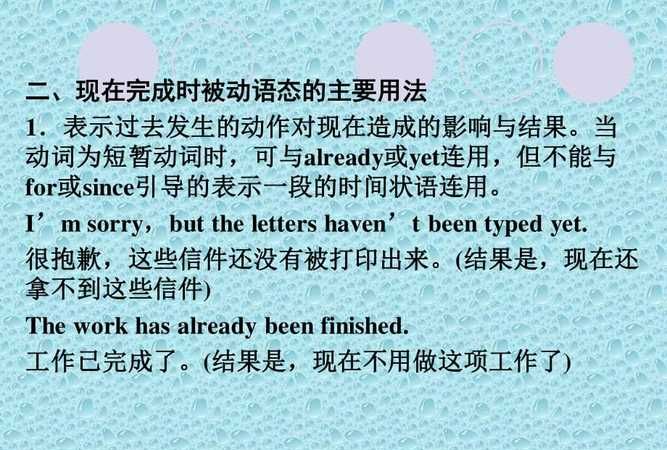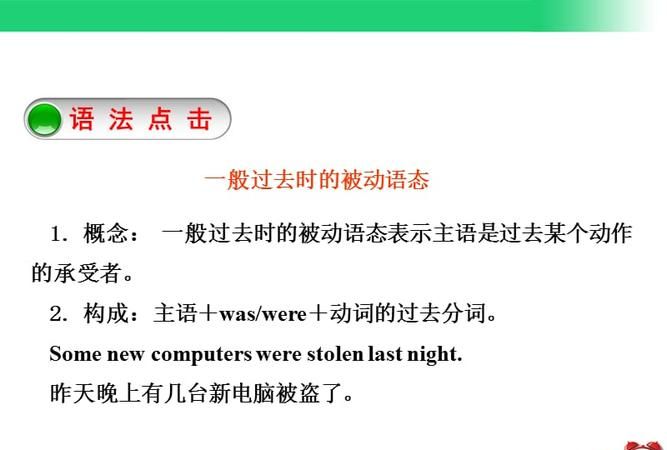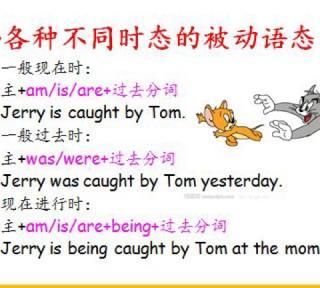本文目录
被动语态的特殊用法有哪四种
举例:仔细看
1、不知道或没有必要指出谁是动作的执行者时.
The bridge was built last year.这座桥是去年建造的.
He was elected chairman.他被选为主席.
2、 当更加强调动作的承受者时.此时动作的执行者由by引导置于谓语动词之后,不需要时可以省略.
The room hasn't been cleaned yet.房间还没有打扫.
The tiger was killed by him.老虎被他杀死了.
3、当动作的执行者不是人时,多用被动语态.如:
The window was blown by wind.窗户被风吹开了.
The whole village has been washed away by the flood.整个村庄都被洪水冲走了.
4、表示客观的说明常用"It is + 过去分词."句型.
It is said that Lucy has gone abroad.据说露茜已经出国了.
It is believed that he is a spy.(=He is believed to be a spy.)大家相信他是个间谍.
其它常见的"It is + 过去分词+ that"句型还有
It is reported that…据报道
It is said that…据说
It is believed that…大家相信
It is suggested that…有人建议
四、主动语态变为被动语态
转换图示:
1、主动语态变为被动语态的步骤:
(1)将主动句的宾语变为主语:
注意:如果主动句的宾语是代词,需将其由宾格变为主格.如:
Tom killed him.→ He was killed by Tom.
(2)将动词改为"be+过去分词".
注意:
They held a meeting yesterday.→ A meeting was held by them yesterday.
他们昨天开会了.
(3)将主动语态的主语改为be…放在谓语动词后.
注意:如果原主语是代词,则应由主格变为宾格.
He sang a song.→ A song was sung by him.
2、主动语态变为被动语态的注意事项:
(1)主动句中的主语如果是people,we,you,they,somebody等含糊地表示"人们"、"大家"的单词,变为主动句时,通常删去"by…",但原主语被强调者除外.如:
They set up this hospital in 1975.→ This hospital was set up in 1975.
这所医院建于1975年.
Only he can finish the job.→ 只有他能完成这项工作.
The job can be finished only by him.这项工作只能由他来完成.
(2)含有双宾语,即直接宾语和间接宾语的句子,每个宾语都可变为被动语态的主语,即其被动语态有两种形式.但多以间接宾语作主语.
Jack told us the truth.杰克告诉了我们真相.
We were told the truth by Jack.
The truth was told (to) us by Jack.
五、动词的主动形式表示被动之意
以主动形式表示被动之意的动词多为连系动词,如:look,feel,smell等.下列动词没有被动式:happen,cost,take,have
An accident was happened yesterday.(×)昨天发生了一起事故.
An accident happened yesterday.( )
The flower smells sweet.这花闻起来很香.
The watch looks good.这表看起来很好.
This book sells well.这本书畅销.
六、各种时态的被动语态举例(以动词do为例)
1.一般现在时(am/ is/ are +done)
English is spoken by lots of people in the world.世界上的许多人都说英语.
Class meeting is held every Thursday.每周四都举行班会.
The classroom is cleaned by the students every day.学生们每天都打扫教室.
2.一般过去时(was/ were +done)
The cup was broken by the boy.杯子被那个男孩打碎了.
He was saved at last.他最终获救了.
My bike was stolen.我的自行车被偷了.
3.一般将来时与过去将来时(will/ shall be +done; would/should be +done)
A speech will be given this afternoon.今天下午有一个演讲.
A new road will be built next year.明年要修一条新马路.
I thought thousands of people would be helped.我认为将有数千人得到帮助.
4.现在进行时与过去进行时(am/ is/ are being +done; was/ were being +done)
The machine was being repaired at this time yesterday.昨天这时,机器正在被修理.
The problem is being discussed now.问题正在被讨论.
A bus is being pushed by the passengers.路人正在推一辆公共汽车.
5.现在完成时(have/ has been + done)
Two hundred trees have been planted by now.到现在为止,已经种了二百棵树了.
The book has been read many times by me.这本书已经被我读了许多遍了.
Several soldiers have already been killed in the conflict.在冲突中已经有几名士兵被杀害.
6.过去完成时(had been+done)
They said they had been invited to the party.他们说已经被邀请参加晚会了.
She found the house had been destroyed by the storm.她发现房子已经被暴风雨摧毁.
He had been tortured by the illness for many years before he died.
他在去世前已经被疾病折磨很多年了.

英语被动语态的用法归纳
被动语态,即不知道动作执行者或强调动作承受者的一种语态。英语的语态是通过动词形式的变化表现出来的。英语中有两种语态:主动语态和被动语态。这些你都了解吗。接下来我在这里给大家带来英语里被动语态的用法,我们一起来看看吧!
英语里被动语态的用法
1、用主动形式表示被动意义。
主动形式来表示被动意义主要有以下六个考点:
1)某些连系动词如 smell,feel,taste,sound,prove等可表达被动含义。如:
The story sounds interesting. 这个故事听起来很有趣.
The apple smells nice.这个苹果闻起来很香。
2)某些表示“发生”(happen,take place)“爆发”(break out/ burst out)和“传播(spread)”等不及物动词在句子中表达被动含义。如
Great changes have taken place these years in my hometown.
近几年我的家乡发生了很大的变化。
3)由介词for,on,above,under等构成的短语经常可以表达被动含义。如:
And some of her famous photos are on display in this exhibition.
她的一些著名的画在这次展览会上被展出。
这个句子里的on display就是主动形式,表示被动的含义。
4)形容词 worth后面跟动名词表示被动含义。如:
The book is worth reading. 这本书值得一读。
5)在need,want,require,deserve和bear等词的后面,动名词用主动形式表示被动含义,它的含义相当于动词不定式的被动形式。如
6)某些动词不定式用主动形式表被动含义。
有些形容词后跟不定式作状语,而句子的主语又是动词不定式的逻辑宾语时,这时常用不定式的主动形式表达被动含义。如nice,easy,fit,hard,difficult,important,impossible,pleasant,interesting等词。举个例子同学们来体会一下:
Sometimes,business English is hard to understand.有时,商业英语很难理解。
2、被动形式表示主动意义。
被动形式表示主动意义主要有下面两个考点需要同学们注意:
1)一些固定词组,它们的被动形式通常表示主动意义。
例如be concerned with/ about(关心),be dressed in(穿着). be hidden(躲藏起来),be located(位于),be lost in(陷入,迷路),be seated(就座)等。大家看下面例句:
That’s fine,as far as we’re concerned. 就我们而言,那样挺好。
After everyone was seated,the teacher began to read the result.
同学们就座后,老师开始读考试结果。
2)还有一些动词构成的被动形式也表示主动意义。
这类词组有: be used to(习惯于),be born(出生),be determined(决心,决定),be prepared(准备)等。如:
英语里被动语态的例句
People play football all over the world.
世界各地的人都踢足球。
Football is played all over the world.
世界各地的人都踢足球。
The workers are building a road.
工人们正在修建一条路。
A road is being built.
正在修建一条路。
Mother gave me the present.
母亲给我这件礼物。
I was given the present by Mother.
这件礼物是母亲给我的。
My friend lent me those books.
我的朋友给我那些书。
I was lent those books by my friend.
这些书是朋友给我的。
They asked him some questins.
他们问了他几个问题。
He was asked some questions (by them).
他被问了几个问题。
I forgave him his rudeness.
我原谅了他的粗鲁。
He was forgiven his rudeness by me.
他的粗鲁被我原谅了。
The monitor told us that there would be a lecture on physics tomorrow morning.
班长告诉我们明天上午有一个物理讲座。
We were told that there would be a lecture on physics tomorrow morning.
我们被告知明天上午有一个物理讲座。
The weatherman warned us that the hurricane was on the way.
天气预报员告诫我们飓风就要来临。
We were warned that the hurricane was on the way.
我们被告诫飓风就要来临。
I found a watch lying on the ground.
我发现地上有一只手表。
A watch was found lying on the ground.
在地上发现一只手表。
They named their baby girl Mary.
他们给他们的女儿取名为玛丽。
Their baby girl was named Mary.
他们的女儿被取名为玛丽。
They made the horse work the whole day.
他们让马干了一整天活。
The horse was made to work the whole day.
马被驱使干了一整天活。
The nurse was looking after the old man.
护士正在照看那位老人。
The old man was being looked after by the nurse.
那位老人由护士照看。
We often talk about the days we spent in the countryside.
我们经常说起我们在农村度过的日子。
The days we spent in the countryside are often talked about.
我们在农村度过的日子经常被谈起。
You should pay attention to your pronunciation.
你应该注意你的发音。
Your pronunciation should be paid attention to.
你的发音应被注意。
You must hand in your homework tomorrow.
你们明天必须交作业 。
Your homework must be handed in tomorrow.
明天必须把你们的作业交上来。
We shouldn't look down upon cleaners.
我们不应该轻视清洁工。
Cleaners shouldn't be looked upon.
清洁工不应该被轻视。
Everybody likes the cook.
大家都喜欢这个炊事员。
The cook is liked by everybody.
这个炊事员受到大家的喜欢。
He wrote a letter.
他写了一封信。
A letter was written by him.
一封信是由他写的。
We shall finish the work soon.
我们不久将完成这项工作。
The work will be finished soon by us.
这项工作不久将由我们完成。
We have sent for the doctor.
我们派人请大夫去了。
The doctor has been sent for.
已经派人请大夫去了。
They have successfully carried out the Party's policy.
他们很好地贯彻了党的政策。
The Party's policy has been successfully carried out.
党的政策得到了很好的贯彻。
People looked down upon women in the past.
过去人们轻视妇女。
Women were looked down upon in the past.
妇女在过去受到轻视。
We must handle this thing with care.
我们必须轻拿轻放这东西。
This thing must be handled with care.
这东西必须轻拿轻放。
They advised her to take the medicine.
他们劝她吃药。
She was advised to take the medicine by them.
他们劝她吃药。
He wrote the composition with great care.
他仔细地写了作文。
The composition was written with great care by him.

被动语态和主动语态的用法
被动语态(一般现在时)
主动语态变被动语态时,主动语态句中的宾语变成被动语态句中的主语,主动语态句中的主语成为被动语态句中的动作的发出者。
1.一般现在时 is\am\are+P.P(过去分词)
2.一般过去时 was\were+P.P
3.一般将来时 will be+P.P
4.现在进行时 is\am\are+being(固定不变)+P.P
5.过去进行时 was\were+being(固定不变)+P.P
6.现在完成时 have\has been+P.P
7.过去完成时 had been+P.P
1.表示正在进行的动作,
现在进行时 is\am\are+being(固定不变)+P.P
2.现在完成时 have\has been+P.P,
3.people 和build 之间是主动关系
4.东西被偷了,那一般当然是人去偷啊,所以变成主动语态,就用人作主语了。
5.一组同学正在讨论这个问题。
练习:
1.主动:The children gave the foreign guests a warm welcome.
被动:The foreign guests were given a warm welcome by the children.
孩子们热烈地欢迎外宾。
2主动:People regard him as brilliant. 被动:He is regarded as brilliant by people.
人们认为他很有才华。
3.主动: Somebody had cleaned my shoes. 被动: My shoes had been cleaned by somebody.
有人早已把我的鞋子擦了。
4.主动:No one has ever beaten him at tennis.
被动:He has never been beaten at tennis.
就网球来说还没有人是他的对手。

英语主动语态变被动语态加不加by
英语的语态分为主动语态和被动语态两种,而在英语中习惯使用被动语态,汉语中以主动语态为主。中主动语态表示主语是动作的发出者或执行者,而被动语态则表示主语是动作的承受者。那么主动语态如何转化成被动语态呢?
一、被动语态的构成
被动语态由“be动词+过去分词”构成:如
Everybody likes the cute girl. 大家都喜欢这个可爱的女孩。(主动语态)
The cute girl is liked by everybody. 这个可爱的女孩受到大家的喜欢。(被动语态)
二、主动语态变被动语态的基本方法
将主动语态的宾语变为被动语态的主语,将主动谓语变为被动谓语(be+过去分词),将主动语态的主语变为by短语(在被动句中用作状语),如:
He finished the task. → The task was finished by him.
注:如果不强调动词发出者,被动语态中的by短语通常可以省略。
三、 特殊用法
主动句可以转换成两种被动句型,它们通常是一些表示客观说明的句子,如:
People believed that the old man is innocent. 大家相信那个老人是无辜的。
→ It’s believed that the old man is innocent.. 大家相信那个老人是无辜的。
→ The old man is believed to be innocent. 大家相信那个老人是无辜的。
比较上面两类被动句型可以发现,一类是“it+be+过去分词+that从句”,另一类则是“主语+be+过去分词+不定式”,通常可用于这两类被动句型的动词有suppose, think, understand, assume, believe, expect, presume, report, say, fear, feel, know,等,如:
It’s known that she is a kind girl. =She is known to be a kind girl. 大家知道她是个善良的女孩。
It’s expected that he will be better soon. = He is expected to be better soon. 他应该很快就会好起来。
以上就是主动句变被动句的方法。其实,主被动在我们写作或翻译过程中还是非常重要的,英语多被动,汉语多主动,所以学会这两种语态的转变对我们今后的学习至关重要。所以,希望大家能多思考对比,反复练习运用,尽快掌握该知识点。

以上就是关于被动语态有趣导入视频,被动语态的特殊用法有哪四种的全部内容,以及被动语态有趣导入视频 的相关内容,希望能够帮到您。

